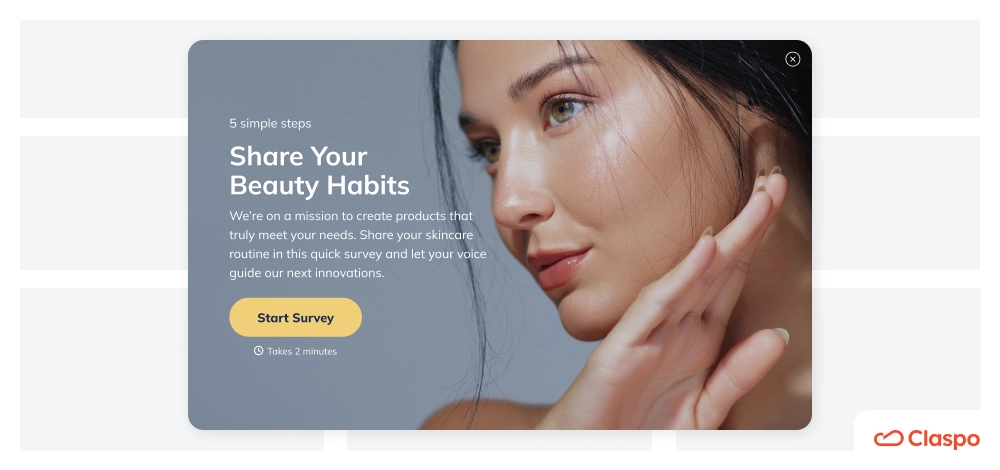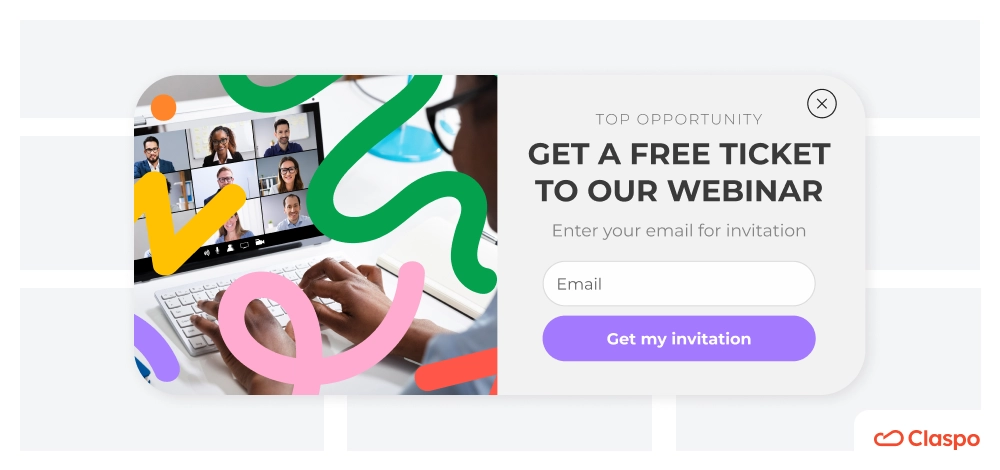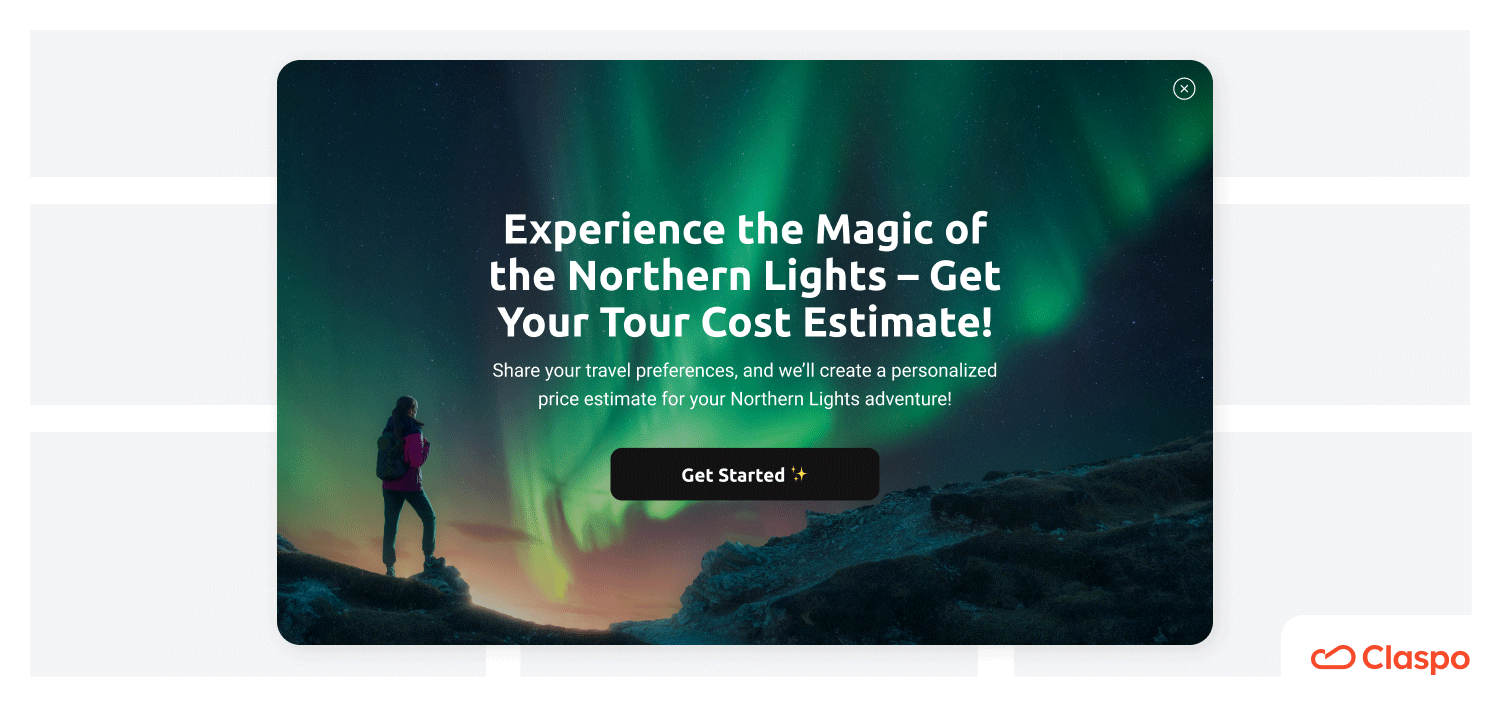14 Best Lead Сapture Pop-Up Examples to Grow Your Contact List
You’ve got traffic flowing to your site, your content is solid, and your offers are irresistible — but your conversion rate is like a ghost town. Visitors come, look around, and leave without a trace — no emails or sign-ups, just crickets. Marketers everywhere face the same challenge. You know lead capture popups work, yet somehow, yours aren’t delivering.
We’ve done the detective work for you, so you don’t have to. We’ve analyzed real-life examples of lead capture popups, uncovering exactly what makes them irresistible. We've also investigated the best timing, triggers, and pop-up design tricks that turn casual visitors into engaged subscribers.
But we didn’t stop there. We put together a step-by-step tutorial on how to build an interactive lead capture popup with instant segmentation. So, you can automatically sort leads into six different customer groups right from the start.
If you’re tired of chasing leads like a cat chasing a laser pointer, stick around. You’re about to learn how to improve your lead capture and make your popups do the hard work for you.
What Is a Lead Capture Popup, and Is It Effective?
Email marketing is like the overachiever in lead generation — affordable, low-maintenance, and pulling in a 312% ROI within 3-6 months. Of course, email marketing doesn’t magically work on its own — you need contacts first. And what’s the easiest way to get more leads? Widgets, in particular, lead capture popups. Annoying? Only if you do it wrong. Effective? Absolutely. According to Mailchimp, users of this ESP saw an average of 50.8% growth in their email lists after adding a signup pop up form to their websites.
But let’s be clear: a high-converting lead capture popup isn’t just a box that says, ‘Give us your email for no reason.’ That’s like asking someone to hand over their house keys because you said ‘please.’ You need to offer something worthwhile — like a discount code, an exclusive eBook, or a VIP pass to your next big sale. A well-designed email collection tool doesn’t just yell, ‘HEY, SIGN UP!’ and expect results. It strategically appears when visitors are most likely to engage — whether after they’ve read a juicy piece of content, lingered on a product page, or shown exit intent. It’s all about timing, relevance, and making the offer too good to ignore.
Based on our experience, properly optimized lead capture popups can convert at rates of 3% to 11%, sometimes even higher. That means that for every 1,000 visitors, you could gain 30 to 110 new email subscribers. Not too shabby for a box with a call-to-action, right?
Why Are Lead Capture Popups Important
Marketers are constantly juggling tight budgets and the never-ending quest for more leads. Paid ads? Pricey. Influencer marketing? Expensive and unpredictable. Organic traffic? Great, but it often just browses and bounces. That’s where effective lead capture popups come in to turn your existing visitors into subscribers without burning through your budget.
Lead Capture Pup-Ups Lower Cost Per Lead
Getting traffic to your site is one thing — turning that website traffic into leads is another battle entirely. And let’s be honest, pouring more money into ads just to watch visitors leave without converting is like throwing dollar bills into a bonfire.
Lead capture popups maximize the ROI of your existing traffic by nudging visitors to leave their contact information before they disappear. Whether they came through SEO, social media, or paid lead capture campaigns, popups give them a reason to stick around and engage.
Here are some marketing metrics that could be increased:
- Cost Per Lead (CPL) — drops because popups are an effective way to generate leads from website visitors you’ve already attracted.
- Return on Ad Spend (ROAS) — improves as more of your paid traffic converts.
- Marketing ROI — increases by making lead gen more cost-effective.
Unlike ads, lead capture popups run 24/7, don’t require ongoing manual effort, and work in perfect harmony with content marketing.
Using Lead Capture Popups Fix Sales Funnel Leaks
Most visitors won’t buy on their first visit. It’s not that they don’t like you; they just need time (or maybe a discount code to sweeten the deal). Without a structured way to capture and nurture them, they leave... and often don’t come back.
Lead generation popups step in to collect leads and grow email lists, segment users based on interest, and deliver valuable content that warms up prospects over time. For example, quiz popups help you capture users' contacts and segment them based on their preferences to send tailored email sequences that guide prospects toward a purchase.
Here are marketing metrics that you can improve using popups:
- Lead-to-Customer Conversion Rate — more nurtured leads turn into paying customers.
- Customer Lifetime Value (CLV) — Increases as you build relationships.
- Sales funnel efficiency — reduces drop-offs between awareness and conversion.
Popups Grow Your Email List Way Faster
Building an email list from scratch is like trying to grow a social media following without posting anything: it's slow, frustrating, and easy to give up on, unless you use a good email list builder.
Pop-ups for lead capture speed up the process by offering incentives (discounts, exclusive content, early access) in exchange for email signups. And the best part? They do it automatically, ensuring you collect leads legally and efficiently. GDPR & CCPA compliance is built into most lead capture tools, so you can collect data without legal headaches.
Here are marketing metrics to increase:
- Email list growth rate — pop-ups make list-building way faster.
- Lead Quality Score — higher engagement when popups target the right audience.
- Subscriber Retention — fewer unsubscribes when leads are genuinely interested.
Lead Capture Popups Make Your Marketing Funnel Actually Work
A good marketing funnel moves people smoothly from visitor to lead and customer. A bad funnel? Well, that’s just a leaky bucket. Lead generation popups reinforce every stage of the funnel:
- Top of funnel — convert casual visitors into leads before they leave.
- Middle of funnel — segmenting and lead nurturing with email sequences.
- Bottom of funnel — reduce cart abandonment and close more sales.
5 Lead Capture Popup Best Practices
Want to capture more leads without annoying visitors? Optimize your lead capture strategy. Follow these best practices to turn those fleeting website visits into long-term customer relationships.
1. Don’t Just Pop — Plan!
Throwing pop-ups everywhere is like hiring a salesperson to stalk every aisle — a little much. Instead, build a smooth journey with smart lead capture.
Try this:
- A welcome popup with a discount for first-time visitors or buyers.
- A newsletter sign-up embedded in your blog.
- A ‘back-in-stock request’ notification pop-up on sold-out product pages.
- A personalized exit-intent popup with a special offer.
By diversifying your approach, you cater to different user intents, increasing your chances of capturing leads on your website without being intrusive.
2. Gamify It: Make Lead Capture Popup Fun
Filling out a form is no one’s idea of fun. But what if your visitors could win something? Adding interactives like spinning wheels, scratch-off cards, or mystery prize gift pop-ups can turn a sign-up process into an engaging user experience.
For example, instead of a boring ‘Sign up for 10% off’, try a spin-to-win popup where visitors could land anywhere between 5-15% off. The excitement keeps them engaged, and you still capture contact details.
If you want to learn more about using lead capture forms with the wheel of fortune and managing the prize pool, check out this article.
3. Break It Down with Multi-Step Forms
Asking for too much information upfront is like asking someone to marry you on the first date. Instead, ease into it with a multi-step form:
- Step: ask for just the email.
- Step: if they complete that, ask for their name.
- Step: if they’re still interested, maybe a phone number or a product preference.
Each completed step increases commitment, making visitors more likely to finish the process. This approach can even be used for lead generation quizzes or questionnaires that generate personalized product recommendations — just make the results unlock after they enter their email.
4. Personalize Like a Pro
Imagine walking into a store, and instead of a generic greeting, the sales associate says, ‘Hey, you’ve been eyeing those running shoes. Here’s a deal just for you.’ That’s what personalized pop-ups can do.
Claspo’s Merge Tags lets you customize widgets in real time based on a visitor’s behavior. For example:
- Show discounts on the exact product category they’re browsing.
- Address logged-in visitors by name.
- Tailor offers based on the web traffic source (ads, social media) and more.
No need to create dozens of different widgets — Claspo dynamically adapts a single pop-up based on user data. Less work for you, more relevant offers for them. If you want to learn how to set up personalization with Merge Tags, you can read this step-by-step guide and this one.
5. Test and Tweak
A pop-up that works okay is nice. A pop-up that converts like crazy is better. A/B testing helps you refine your approach by comparing different designs, copy, incentives, and display rules. Test things like:
- Headlines: ‘Get 10% Off’ vs. ‘Your Exclusive Discount Inside’.
- CTA buttons: ‘Subscribe Now’ vs. ‘Claim Your Discount’.
- Pop-up timing: immediate vs. after 10 seconds vs. exit intent, and so on.
Keep what works, ditch what doesn’t, and fine-tune until you find the highest-converting formula. By the way, check out our article on how to double your subscription form conversion with experimentation and different strategies.
14 Best Lead Capture Popup Examples
Now, let's take a look at lead generation form examples and the ways they can be used in different industries.
E-Commerce Lead Generation Pop-Ups
Richer Poorer uses exit-intent pop-ups to snag visitors before they leave, offering free shipping as a sweetener. Don’t miss the radio buttons that let users pick what catches their eye. Instant segmentation means your first follow-up email is packed with relevant content and offers.
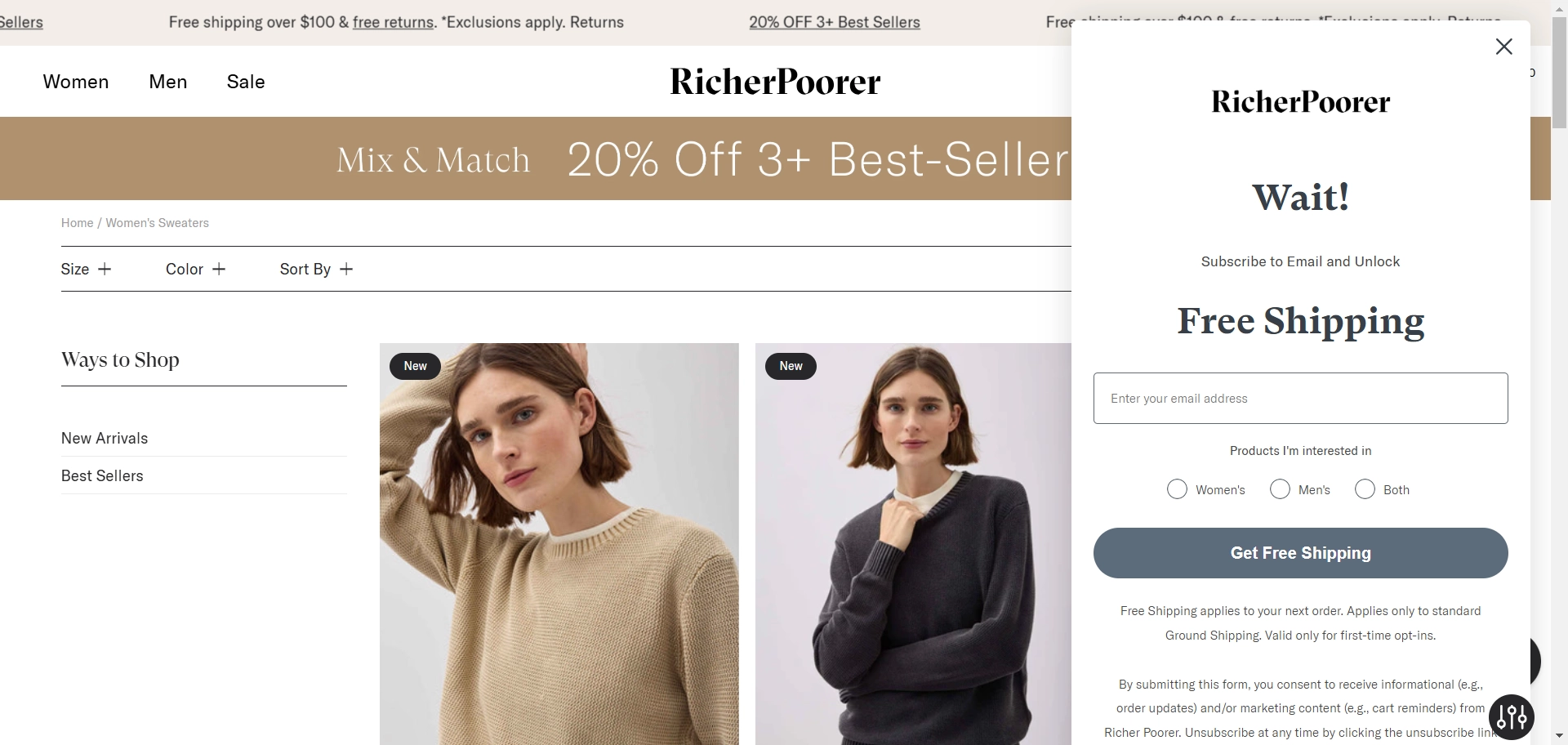
Interestingly, instead of the classic pop-up, the site uses a floating box that doesn’t block the page content. It’s less intrusive and reinforces the widget’s incentive by showing users the products they want and a bold free shipping message. This approach can sway users toward subscribing and making a purchase.
MSBLUE Jewelry catches new visitors with instant segmentation using radio buttons. Along with the email newsletter, users can opt for SMS updates too.

The widget also includes a Consent checkbox, so subscribers know exactly what messages they’ll get. Plus, it pops up via launcher, so it’s less ‘in-your-face’ than a typical pop-up.
Nothing grabs attention quite like the chance to win something. This spin-to-win widget takes a classic gamification approach, turning the lead capture page into a mini thrill ride. One of the slides in a rotating banner teases visitors with the chance to spin the wheel. To unlock the game, users must enter their email.
The best part is that the widget doesn’t steal focus from the main conversion goal. It lives within a multi-slide banner, keeping other promotions visible while seamlessly integrating lead capture. This setup ensures users stay engaged rather than feeling pressured to make a decision on the spot.
Lullabellz knows how to turn FOMO into lead-gen gold. Its lead capture pop-up isn’t just about collecting emails — it’s about exclusivity. Visitors are invited to sign up for early access to the upcoming sale and get a discount code on first order. This double-layered incentive encourages users to provide both their email and phone number.
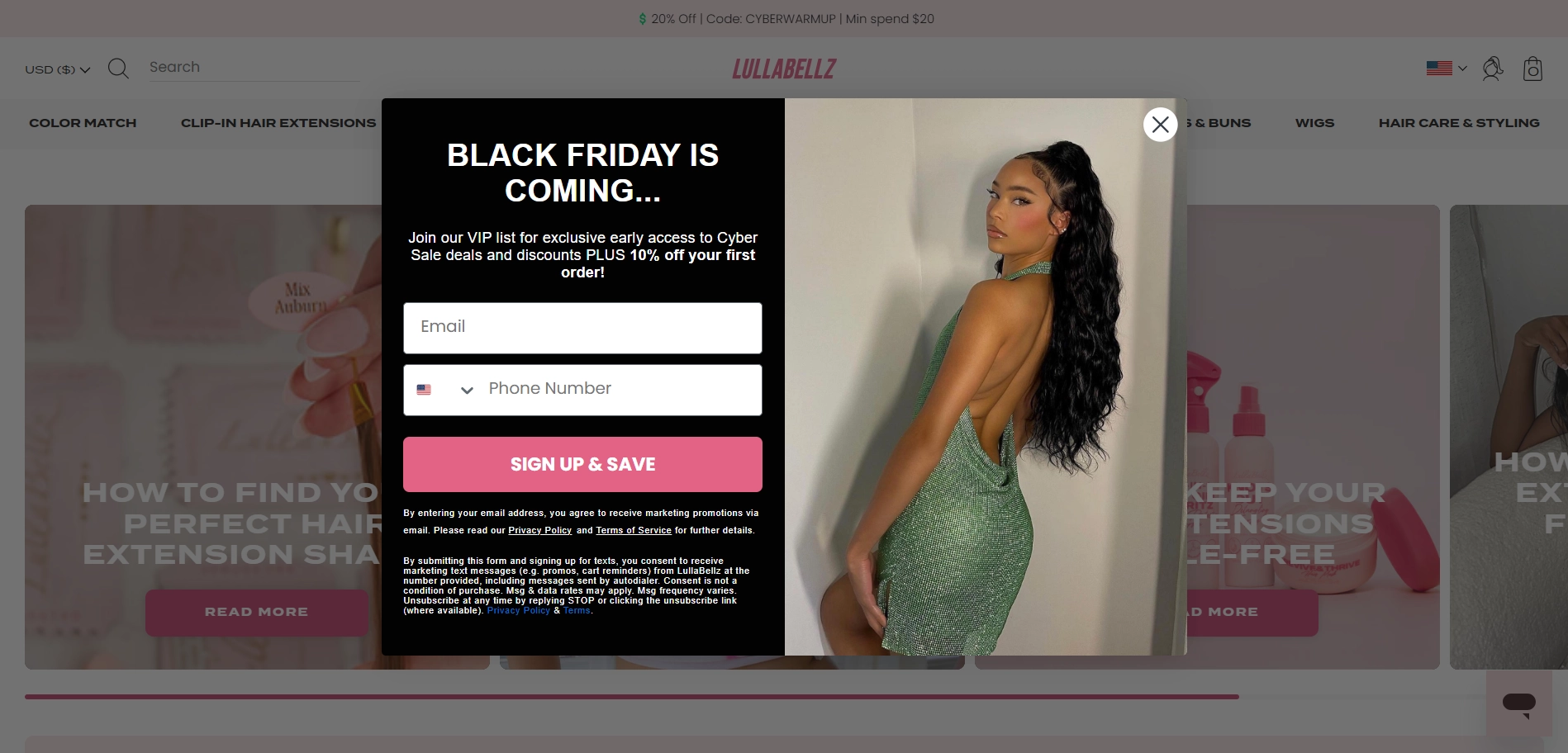
This approach not only drives the brand’s subscriber list but also builds a foundation for multi-channel engagement, ensuring that customers stay connected beyond just their inboxes. The challenge? Many users hesitate to share their phone numbers, fearing endless spam texts or, worse, unexpected calls. The brand tackles this head-on with clear opt-out instructions, reassuring visitors that they’re in control. The double benefit of early access and a discount should also nudge them to fill out the lead gen form.
Maudau uses a two-step subscription flow — because why settle for just an email when you can personalize the entire experience? Here’s how it works:
- Step one: users enter their email — simple, no pressure.
- Step two: a second screen asks for pet details using dropdowns and a calendar for quick, hassle-free input.

This isn’t just a way to collect data — it’s a way to craft hyper-personalized offers. Subscribers get tailored recommendations for their furry (or feathery) friend, plus a special birthday treat for their pet. Because let’s be honest — who wouldn’t love a surprise for their beloved companion? With this approach, the brand builds relationships with pet owners by making every message feel like it was made just for them. Also, the popup looks lovely and playful.
SaaS Lead Generation Popup Examples
This lead generation pop-up for SaaS is all about educating and converting. It is targeted at users browsing the blog, landing page, or other dedicated lead capture pages and appears when they’re already engaged, making it the perfect moment to offer value.
A free whitepaper as a lead magnet positions the brand as a helpful resource, not just a service provider. The minimalist, frictionless form consists of just an email field and a bold call-to-action button, keeping the process quick and user-friendly. A privacy policy checkbox reassures visitors that their data won’t be misused, helping to build credibility.
By using timing and valuable content, this pop-up turns warm visitors into leads, ready for follow-up and conversion.
Sopro’s conversion-focused pop-up offers a personalized consultation that moves potential leads closer to a sales conversation.

A consultation request framed as a question — ‘Rethinking your outreach strategy?’ — immediately addressing a common pain point. The supporting text reassures visitors that the company has helped thousands of B2B brands, reinforcing social proof and credibility. A multi-field lead capture form includes:
- First and last name — personalization for a tailored follow-up.
- Work email — ensures business-related communication.
- Phone number — includes country selection and streamlining contact options.
- Website — helps assess lead relevance and company size.
- B2B checkbox — pre-qualifies leads, ensuring they fit the company’s target audience.
A clear privacy policy link reassures users about data handling. The visual design adds a personal touch and humanizes the brand.
Online Education & Coaching Lead-Generation Pop-Up Examples
A lead generation pop-up from Copyblogger has a compelling, benefit-driven headline that directly appeals to the target audience (such as marketers, copywriters, and entrepreneurs). The pop-up highlights proven success and creates urgency with a limited-time free access offer.

Single-field signup is a low-friction opt-in method that increases conversions. A testimonial from a recognized expert validates the training’s effectiveness and reduces hesitation. The testimonial section, which includes an expert’s image, adds authenticity and builds trust. Unsubscribe reassurance lowers commitment fear, making signup feel risk-free.
This high-converting lead capture popup effectively targets those interested in webinars, business training, and professional growth.
A compelling, high-value proposition immediately highlights the key benefit. The pop-up emphasizes exclusivity and urgency by positioning it as a top opportunity. Single-field opt-in is low-friction and maximizes signups. Clear, action-driven CTA reinforces the benefit and encourages immediate action. The combination of white space and bold typography ensures readability.
B2B & Agencies Lead Generation Pop-Up
The exit-intent popup from Fortune Business Insights is strategically designed to retain potential leads. Instead of letting users leave without engagement, this pop-up provides two clear alternatives:
- Encourages direct communication, ideal for personalized inquiries.
- Allows visitors to explore the content before committing.

Dual CTA strategy appeals to different types of leads: those who want immediate answers vs. those who prefer research materials. The contrasting, clickable CTA buttons enhance user engagement and make it easy to take action. Prominent copywriting — ‘Didn’t find what you’re looking for?’ — immediately captures visitors’ attention and resonates with users who might be searching for specific data. Visual storytelling — the compass imagery reinforces the idea of finding the right direction with expert insights.
Services and Consultations Lead Capture Popup
This multi-step pop-up from Celebu Studio is designed to efficiently capture leads and qualify them while offering a compelling incentive: a free product assessment. It builds trust and increases conversions by offering value upfront.

The pop-up guides users through simple steps, collecting essential details without overwhelming them. A multi-step form popup with a progress bar minimizes friction compared to long, one-page forms. Users feel a sense of progression, reducing drop-off rates and encouraging form completion. Clean UI and visual guidance keep users focused.
By the way, this example is a great demonstration of how the brand customized one of our popup templates. If you like this design, here it is:
The next lead generation popup combines visual engagement and detailed data collection in a single widget.
The built-in image slider showcases past work, giving users a visual preview of the consultant’s style and quality (because seeing is believing). It builds credibility with real-life success stories. Users can enter their details, select service preferences, and schedule consultations without switching screens. Dropdown fields efficiently categorize contact information, streamlining the process for both the user and the business. A date picker allows instant appointment scheduling, reducing friction and making conversion more likely.
Media Lead Generation Pop-Up Examples
Esquire’s email subscription popup form is designed to capture readers who want to stay updated with fresh content daily. The clean and bold design ensures clarity and focus on the subscription call-to-action.

It clearly states the value proposition and uses engaging, conversational copy to make the offer more appealing. A single input field keeps the sign-up process simple. It includes links to the Terms of Use and Privacy Notice, adding transparency and credibility. The Primary CTA is bold and visually distinct, making it easy to opt in. A secondary opt-out link provides a clear exit, reducing frustration.
The example from ‘All Things Newsletter’ takes a fresh approach. Its clean, airy popup design blends seamlessly into the page, making it feel less intrusive while still grabbing attention.

The widget is triggered by scrolling (40% of the page), ensuring it appears when users are already engaged with the content. Instead of a generic placeholder text like ‘Enter your email,’ the input field includes the subscriber count, creating a sense of urgency via social proof. It encourages sign-ups by showing real engagement from others — making users feel like they’re joining an exclusive community. There is no excessive branding. A simple logo serves as both an identifier and a visual element for the widget.
How to Create a Quality Lead Capture Popup with Claspo
Let’s break down the process of creating a lead-capture pop-up using an imaginary online shop that sells premium coffee blends and loose-leaf teas. Since we don’t want to distract website visitors from making a purchase, we’ll use an exit-intent trigger, ensuring that the widget only appears when visitors are about to leave. This way, even if they don’t buy anything, we can still capture their interest and turn them into potential customers.
Our widget is a multi-step exit-intent form designed to engage site visitors by offering a valuable freebie. Instead of a generic ‘Sign up for our newsletter,’ we’re making the experience interactive and relevant. Here’s how it works:
- Step: we ask the visitor whether they prefer coffee or tea.
- Step: based on their choice, we offer free downloadable guides.
- Step: we collect their email in exchange for the guides.
This lead generation strategy makes the experience personalized, engaging, and rewarding while growing the store’s email list with a genuinely interested audience.
Let's create a lead capture popup using a lead form template from our library. We’ve chosen this one:
Then, we customized the entry page of our multi-step form to match the cozy, inviting feel of a coffee and tea specialty store. Here’s what we did:
- Changed the image (you can upload your own or choose one from our built-in image library).
- Cropped it using the built-in popup editor.
- Tweaked the close button so visitors can easily spot it.
- Added our text.
- Added a second button to let users choose between coffee and tea.
Here’s the result of our efforts in designing the lead capture pop-up:

Now, let’s set up conditional logic so each button opens the right page. For example, the ‘Coffee lover’ button leads to page two, and the ‘Tea enthusiast’ button to page three. To configure this, select the button, go to the General tab, and in Action on click, choose Open widget page and specify the page.
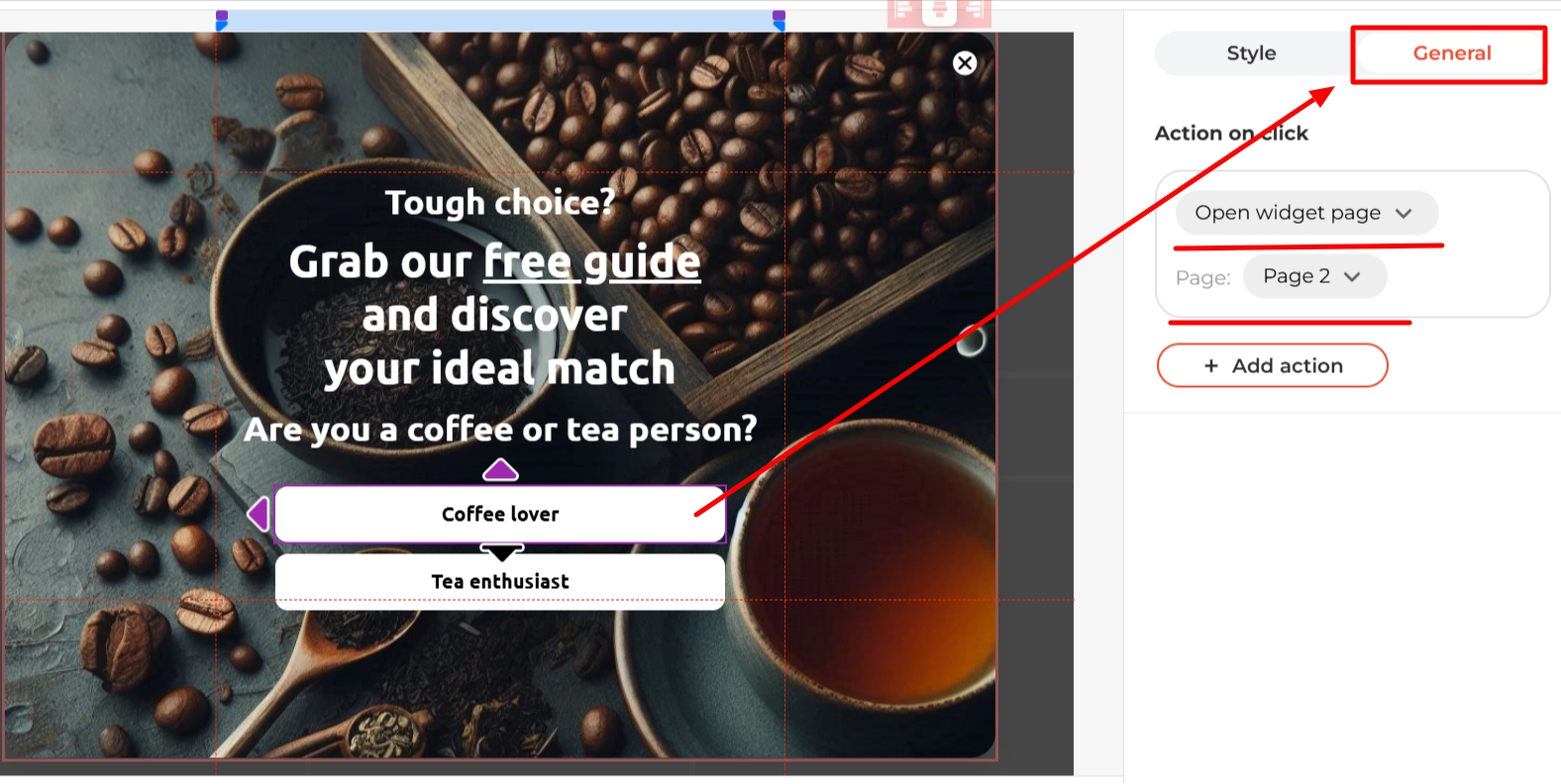
Next, create the second and third pages, which will display based on the button selected. To change the background images, click the image on the right and select the Change button.

Important!
To show different images on each widget page, first activate Do not sync.

We’ll add a Checkbox component with options for subscribers to choose their interests. Coffee lovers can pick between recipes for classic drinks or coffee-based cocktails:

While tea enthusiasts can opt for guides on black or green teas:

This selection helps us identify user preferences, allowing us to create targeted email content. As a result, coffee fans receive content related to their chosen coffee guides, and tea lovers get emails tailored to their tea interests. The Checkbox lets users select multiple variants, creating a valuable third segment — subscribers with broad interests. These users may be interested in receiving extended offers, cross-promotions, and more diverse newsletter content.
Want users to go back and change their input? Just add a second button to the step where you need it. Click the button, go to the General tab, and in the ‘Action on click’ section, choose ‘Previous page’ from the dropdown. That’s it — now they can hop back and edit their answers anytime.

Now, we also need to configure the conditional logic for the button on the second page so that it opens the fourth page directly, bypassing the third page, where we ask about the tea drinkers' guides.
The fourth page will ask for the user's email address. To do this, we edit the text on the template and add the email field component. You can also optionally change the text in the Placeholder.
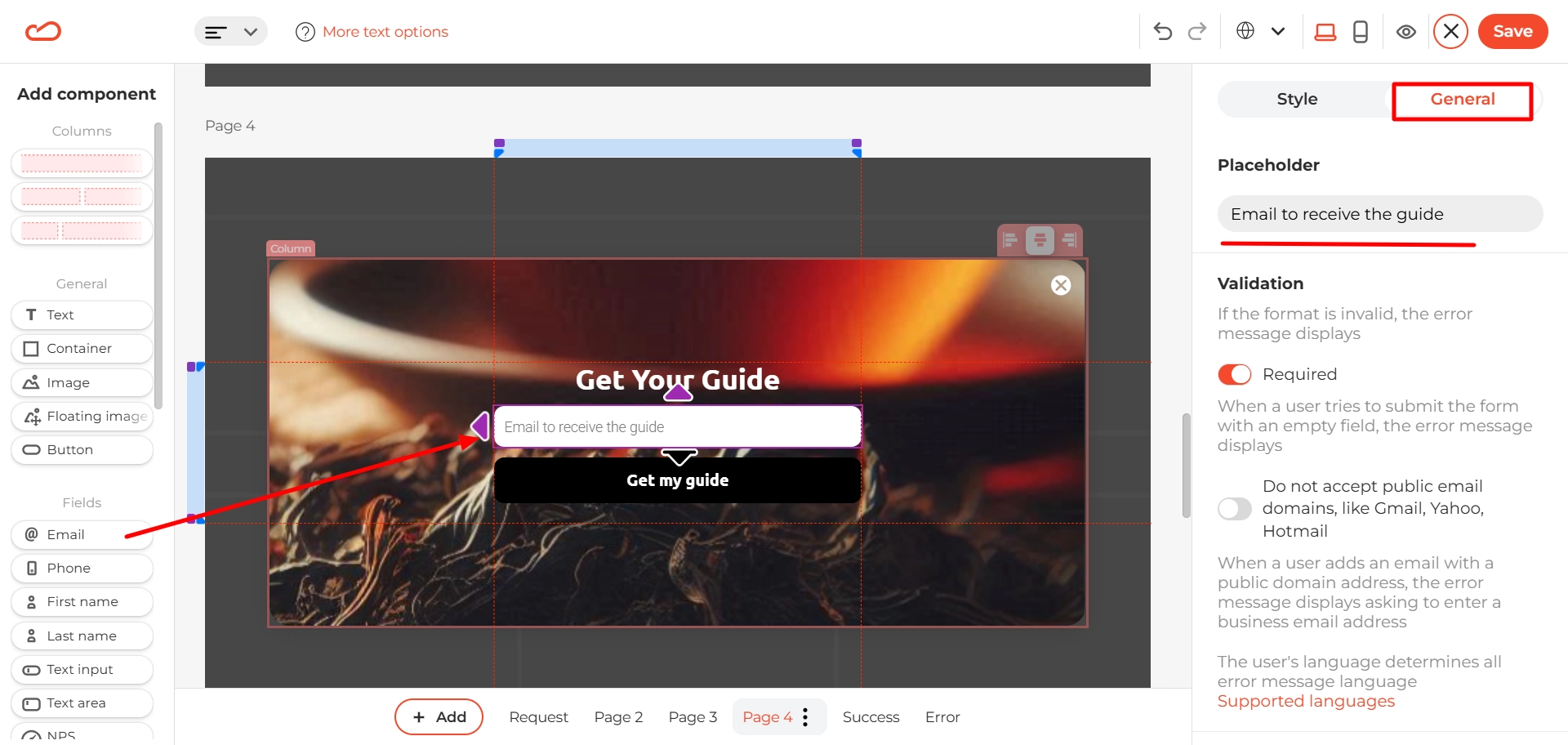
Since we don't need the next steps of this template, we simply delete them from the widget. All you need to do is click on the three dots next to the page numbering and choose Delete from the list.

On the Success page, we need to change the text and explain to the user that the guide will be sent to their inbox.

You can also change the text on the Error page if necessary, but since the templates usually contain suitable messages, we’ll leave it as is.
Time to set the display rules! After saving the design, we head to the settings page and click Edit in the Rule-based section. Under When to display, select Exit-intent and keep the Spend on the page 20 seconds condition. This way, our popup appears to visitors who actually care and spend some time on the page — not just those who stumbled in by accident.
As a result, we have this widget on our website pages:

Before launching the widget, ensure it’s integrated with your ESP, where automatic emails are set to send once a subscriber enters the appropriate segment. In our example, there are six segments: four receive one guide each, and two receive two guides each. Make sure you have the corresponding emails ready to send so they reach recipients' inboxes quickly.
Time to Put Your Lead Capture Popups to Work
By now, you’ve learned how to master the art of interactive and successful lead capture pop-ups like a pro. For those working with a WordPress-based site, we’ve also got a detailed review of the best WP lead generation plugin options, making it easy for you to choose the right lead capture software to maximize your lead generation efforts.
Now that you’ve got the tools and knowledge, it’s time to put your website popups to work and watch your leads grow. With the right approach, your pop up lead capture forms can start making a real difference today, especially since Claspo’s Lifetime free plan gives you access to multi-step forms, gamified pop-ups, advanced targeting, A/B testing, and detailed analytics — all without hidden costs. So, just sign in, get creative, test your designs, and let the conversions roll in.




